











Weekly Specials
Online Shopping; Pickup or Delivery |
|






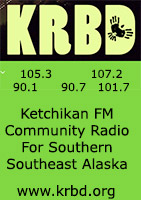
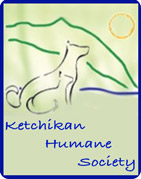

 Contact Contact 
 Webmail
Letters Webmail
Letters
 News Tips News Tips
 Copyright Info Copyright Info
 Archives Archives
Quick News
Search
 Alaska Alaska
 Ketchikan Ketchikan
 SE Alaska SE Alaska
Columns
- Articles
 Dave Kiffer Dave Kiffer
 Money Matters Money Matters
Historical
Ketchikan
 June Allen June Allen
 Dave
Kiffer Dave
Kiffer
 Louise
B. Harrington Louise
B. Harrington
Sports
 Ketchikan Links Ketchikan Links
Public Records
 FAA Accident Reports FAA Accident Reports
 NTSB
Accident Reports NTSB
Accident Reports
 Court Calendar Court Calendar
 Recent Filings & Case Dispositions Recent Filings & Case Dispositions
 Court Records Search Court Records Search
 Sex Offender Reg. Sex Offender Reg.
 Public Notices Public Notices
 AST Daily Dispatch AST Daily Dispatch
 KTN
Police Reports KTN
Police Reports
 Juneau Police Reports Juneau Police Reports
Weather,
Webcams
 Today's
Forecast Today's
Forecast
 KTN
Weather Data KTN
Weather Data
 AK
Weather Map AK
Weather Map
 AK Weathercams AK Weathercams
 AK Earthquakes AK Earthquakes

|
|

Tuesday
August 14, 2018
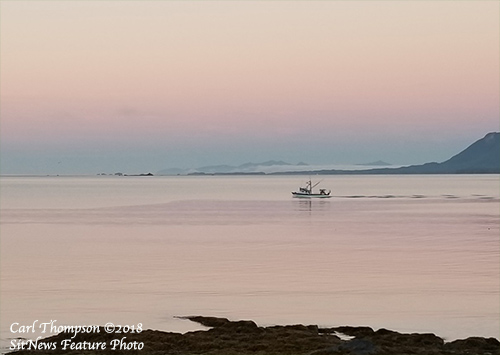
|
A Dusty Rose Sunrise
A fishing boat off Bugge Beach.
Front Page Feature Photo By CARL THOMPSON ©2018
|
|
Ketchikan: DEC Finds Elevated Bacteria Levels at Six Coastal Areas in Ketchikan - The Alaska Department of Environmental Conservation has issued an advisory for six coastal areas in Ketchikan due to elevated levels of bacteria in recent samples of the marine water at these locations.
Water samples collected on August 9, 2018, found six beaches in Ketchikan showing elevated enterococci and fecal coliform levels.
Enterococci and fecal coliform bacteria can come from any warm blooded animal, including birds, seals, and dogs, as well as humans. Potential sources of these bacteria in Ketchikan may include wildlife and pet feces, human waste from private and municipal treatment systems, sewer line leakage, and/or boats in harbor areas. Contact with water impacted by enterococci or fecal coliform bacteria may cause stomach aches, diarrhea, or ear, eye, and skin infections.
The Ketchikan beaches showing elevated enterococci and fecal coliform levels include:
- South Point Higgins Beach (on Port Higgins)
- Shull Beach (south of Whipple Creek)
- Sunset Beach (south end of Mud Bay)
- Thomas Basin (Stedman Street Bridge, mouth of Ketchikan Creek)
- Rotary Beach, pool location (also known as Bugges Beach, south of Saxman)
- Herring Cove Beach (north end of Herring Cove)
The Alaska Department of Environmental Conservation said until sample results consistently meet water quality standards and DEC lifts this advisory, people should take precautionary measures when recreating.
The Alaska Department of Environmental Conservation recommends beach users take normal precautions to avoid exposure, such as avoid swimming in the water, washing after contact with the water, and rinsing fish with clean water after harvesting from the area. The department also recommends that when fishing in these areas people should rinse fish/marine foods with clean water and cook seafood to a minimum internal temperature of 145 degrees Fahrenheit to destroy pathogens.
Fecal coliform bacteria levels were above state limits protecting consumption of raw fish and shellfish at two additional beaches on South Refuge Cove and Mountain Point (cultural food location). A recreational advisory is not in effect for these beaches, but cleaning and cooking fish is recommended. - More...
Tuesday PM - August 14, 2018
Ketchikan: Measles Case in Cruise Ship Passenger Reported - In a Public Health Alert, the Alaska Department of Health & Human Services said a traveler visiting Alaska has been confirmed to have tested positive for measles.
On the afternoon of August 6th, a teenager visiting with her parents from overseas boarded a cruise ship in Vancouver (British Columbia) that was bound for Alaska. Approximately one week prior to boarding the cruise ship, the teenager began experiencing cold-like symptoms while travelling in Thailand, and four days prior to boarding she woke up with a rash (facial), red eyes, and feverishness. Within several hours of boarding the ship, the teenager was put in medical isolation due to persistence of symptoms and the concern for possible measles.The parents reported the teenager had never received the measles, mumps, and rubella (MMR) vaccine.
According to the Dept. of Health, the patient remained in medical isolation on the ship until August 8th when she was transported to PeaceHealth Ketchikan Medical Center. The patient was discharged from the Ketchikan hospital on August 10th. Later that day, the patient was confirmed by polymerase chain reaction (PCR) testing to have been infected with the measles virus.
According to the Alaska Department of Public Health, measle patients are generally considered to be contagious starting four days before rash onset and ending four days after rash onset. Non-immune persons who are in close proximity to an infected person during this timeframe are at risk of developing measles; however, the risk of transmission is considered to be very low by the fourth day after rash onset.
Although the teenager was at the tail end of infectiousness when she boarded the cruise ship (day four after rash onset), out of an abundance of caution, the Centers for Disease Control and Prevention has advised the cruise ship to notify all passengers and crew members who might have been exposed to the patient on August 6th to be alert for potential signs and symptoms of measles and to seek medical consultation if symptoms arise.
The cruise ship passengers disembarked in Seward on the morning of August 13th, and many will be travelling throughout Alaska for a period of time before returning home. According to the Alaska Department of Health, while the risk of secondary cases among these passengers is considered to be very low, it is important for healthcare providers to be aware of the possibility of secondary transmission. - More....
Tuesday PM - August 14, 2018 |
|
Alaska: Primary Election Day is Tuesday August 21, 2018 - In one week, eligible Alaska voters will have an opportunity to participate in the August 21 Primary Election. Voters will decide which candidates will move on to the General Election for the offices of: U.S. Representative, Governor, Lieutenant Governor, State Senate, and State House. There are no ballot measures in this year’s Primary.
“We are proud of the work our team has been doing to make sure we deliver this election with integrity, accuracy and accessibility to the ballot so our voters can choose a candidate confidently through the act of voting,” said State Elections Director Josie Bahnke.
Voters who wish to cast a ballot will need to bring one form of identification to their polling place. Voters may use the following ID: voter ID card, driver’s license, State ID card, current and valid photo ID, passport, military ID card, birth certificate, hunting or fishing license. Voters may also use an original copy of one of the following documents if it contains the voter’s name and current address: current utility bill, government check, bank statement, pay check, or other government document.
If a voter does not have identification when voting, the voter will be asked to vote a questioned ballot.
There are two Primary ballot types available: The Alaska Republican Party primary ballot or the Alaskan Independence, Alaska Democratic, Alaska Libertarian (A-D-L) ballot. Those who pick up the A-D-L ballot will see candidates with the following political affiliation codes listed after their name: (A) Alaska Independence, (D) Democrat, (L) Libertarian, (N) Nonpartisan, and (U) Undeclared. The Alaska Republican Party ballots will specify that all candidates are registered Republicans. - More...
Wednesday PM - August 14, 2108
Fisheries: Fishing fleets travelling further to catch fewer fish - Industrial fishing fleets have doubled the distance they travel to fishing grounds since 1950 but catch only a third of what they did 65 years ago per kilometre travelled, a new study has found.
Researchers from from the Sea Around Us initiative at the University of Western Australia and the University of British Columbia mapped the growth and spread of industrial fisheries since 1950 and found that global trends were dominated by the heavily subsidized fleets of a small number of countries, increasing the total area fished from 60 per cent to 90 per cent of the world’s oceans.
“While most countries continue to focus their fishing efforts on local waters, Taiwan, South Korea, Spain and China have aggressively subsidized vessel and fuel costs to encourage their fleets to operate thousands of kilometres from their home ports,” said lead author David Tickler, a postgraduate student at UWA’s School of Biological Sciences.
Despite this geographical expansion, the catch rates of these fleets – as well as those of the other top 20 fishing countries – have declined dramatically from over 25 tonnes per 1000 kilometres travelled in the early 1950s to approximately 7 tonnes per 1000 kilometres travelled by 2014. Overall, these 20 countries are responsible for 60 million tonnes or 80 per cent of the global industrial fishing catch.
“These findings show that nowadays more fuel is being burned and more time is being spent at sea for every fish caught,” Tickler said. “These diminishing returns to fishing effort are a worrying indicator of the inability of fisheries to sustainably meet consumer demands and previous catch levels.” - More...
Tuesday PM - August 14, 2018
|
Ketchikan: New Executive Director of the Ketchikan Wellness Coalition Announced - The Ketchikan Wellness Coalition announced today the recent appointment of Gretchen Klein as the new Executive Director of the Ketchikan Wellness Coalition (KWC). A longtime resident of S.E Alaska, Gretchen is delighted to be returning to Ketchikan after working for several years on Prince of Wales Island and in Anchorage.
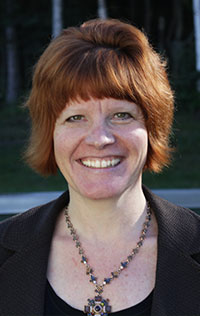
Gretchen Klein
Photo courtesy KWC |
"The Ketchikan Wellness Coalition is much like the role I had at the Prince of Wales Health Network.” explained Klein. “We’re working to strengthen partnerships and efficiency by bringing together community volunteers and service providers to focus on areas of need in the community.
With 20 years’ experience in the non-profit sector, Klein has helped develop non-profit programs and raise philanthropic funds and planned gifts for organizations ranging from the Alaska Public Media, PeaceHealth Medical Center Foundation, Prince of Wales Health Network, Big Brothers Big Sisters, and Youth Court.
Klein was born and raised in Ketchikan and holds a bachelor’s degree in Parks and Recreational Management and Tourism Development. She has been active in East Anchorage Rotary, Prince of Wales Chamber of Commerce Board of Directors, Lions Club International, Delta Kappa Gamma, and currently directs the Totem to Totem Half Marathon as well as coordinating the annual Prince of Wales Island Art Extravaganza. In her spare time, she coordinates efforts across state to raise funds for ADA Camp K for children with diabetes. - More...
Tuesday PM - August 14, 2018
|
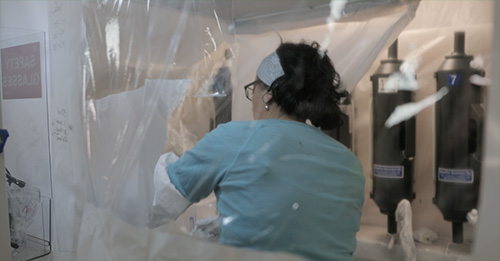
Ana Aguilar-Islas works in her constructed clean-lab on Sikuliaq.
Microcosm Film photo. |
Alaska: Part 3: Sikuliaq improves analysis of phytoplankton’s nutrient needs By LAUREN FRISCH - During the LTER cruise, CFOS chemical oceanographer Ana Aguilar-Islas was often found tucked away in the contaminant-free clean-lab she constructed for her team on Sikuliaq.
Aguilar-Islas measures quantities of iron in collected water samples. Any possible metal that could interact with her samples — from the bottom of the ship to various equipment used for sampling and analysis — could contaminate her data.
"It took hours to clean and construct the lab to make sure incoming equipment wasn’t contaminated with iron, which is everywhere, in every dust particle. And since science equipment is often made from metals, Aguilar-Islas has a whole collection of “metal-clean” equipment, including her own conductivity, temperature and depth instrument with coatings and modifications that keep her samples free of contamination."
Aguilar-Islas studies the nutrients that are essential to phytoplankton, the single-celled photosynthetic organisms at the base of marine food webs. The availability of nutrients affects how many and what kind of phytoplankton can be sustained in the gulf. And because phytoplankton are at the base of the food chain, the number of phytoplankton that can be sustained in the water directly impacts fish species and marine mammals higher up in the food chain that are critical for Alaska’s commercial and subsistence fisheries.
While Aguilar-Islas always sets up a small clean-lab on cruises, the ability to bring her own specialized clean sampling instruments onto Sikuliaq dramatically increased the amount of water she could collect on the ship. And that increased her ability to do complex experiments onboard. - More...
Tuesday PM - August 14, 2018
|
JEFF LUND: Planning for deprivation - It’s 9:38 a.m., I’m four cups of coffee, five pink salmon and 45 pages of The River Why into my day.
It’s at least my fifth read of the book, because as is the case with any book worth re-reading, it’s not just about how the linear story goes down, it’s the universal application and resolving of conflicts that’s the real meat of it.
I went from the couch to the laptop to type (with caffeinated fingers and brain) a response to the following passage:
“The once-monthly fisherman adores his rare day on the river, imagining that ten times the trips would yield ten times the pleasure. But I have lived the gallant fisher’s life, and I learned that not fishing is crucial to the enjoyment of fishing: fishing is a good thing, but too much of a good thing is a bad thing.”
This morning was the first trip to the river this month (eight days old) and I felt it. It’s not that I’ve been sitting around my house reading while the great heat wave of 2018 scorched southeast Alaska and thinned the rivers, I’ve been up on mountains looking for red meat for the freezer. One of the great things about living here is there are often overlapping seasons, so attention to one sport can create the necessary deprivation of another (without the ache) and prevent anything from becoming too routine. - More...
Tuesday PM - August 14, 2018
 |
TOM PURCELL: Americans Too Worried to Vacation - "Here we are in peak vacation season, but I'm afraid to take my paid vacation time off!"
"Regrettably, you are not alone. According to the U.S. Travel Association, more than half of American workers aren't using all of their vacation time. In its Project: Time Off report, the association found that nearly a quarter of Americans haven't had a vacation in the past year - some 12 percent haven't had a vacation in three years!"
"You got that right. While some are enjoying fun in the sun, I'm logging long hours at the office to make sure the boss knows I'm doing a good job."
"You're not alone there, either. According to CNBC, the association found that 61 percent of employees surveyed said they feared appearing replaceable to their bosses, while 56 percent said they can't take a break because there is too much work on their plate. In the 1980s and 1990s, Americans averaged 20 days of vacation a year, now it's down to 17 days a year."
"As bad as I am about taking vacation, the younger people in my office are even worse. They hardly take time off."
"It's funny you say that, because the association found that older generations are more willing to use their vacation time than younger generations. Baby boomers take almost 20 days off a year, whereas millennials, often maligned as lazy, take fewer than 15 days of vacation each year. According to CNBC, this is partly because millennials have fewer vacation days, but also because they 'are preoccupied by a host of worries, including heavy debt loads and career fulfillment.'" - More...
Tuesday PM - August 14, 2018
|

Political Cartoon: Can You Google a Solution?
By Jeff Koterba ©2018, Omaha World Herald, NE
Distributed to paid subscribers for publication by Cagle Cartoons, Inc.
THE “MOTSOS” CAMPAIGN: AN OPEN LETTER TO MARK BEGICH By
David G Hanger - You spent six years as a U.S. Senator, Mr. Begich, and it and you were a real yawner. Your replacement, Senator Conoco-Phillips, at least has someone periodically write something for him in an effort to communicate with his audience, albeit generally rife with lies. “Begich” is a name, and because “Begich” is a name, you have to date basically sat like a toad on a lily, croaking. As you can see, I am just thrilled and chilled at your candidacy for Governor of the State of Alaska.
So what do you have to offer over the Republicans Treadwell and Dunleavy who express such great concern about your and my permanent fund dividends but have absolutely no intent of taxing the oil companies? Or Walker the so-called independent who in fact is a Republican awash in oil with a noggin full of natural gas-fed dreams and obsessions of semi-immortality?
What do you have to offer over them? Are you just another jerk whose sole focus is the oil companies and the Anchorage-Fairbanks corridor to the detriment of the rest of the State? Are you just another sold-out oil lackey?
Is it in short just going to be more of the same old stuff?
What is needed is leadership that dynamically moves this State in a completely different direction, and I don’t see that character in you. I don’t think you have the stuffing or the stones that it will take. - More...
Tuesday PM - August 14, 2018
 |
Property Tax Repeal Referendum in Craig By Andy Deering - Here is my response to Arthur Martin's article No Property Taxes in the City of Craig? A Referendum May Make this a Reality.
At the very outset of the article it should have been made very clear this referendum calls for a gradual elimination of property tax over a six year period. The basic idea is that when we have a balanced budget, revenue windfalls, or reductions in spending be GIVEN BACK TO TAXPAYERS and not simply spent elsewhere as has been done in the past. If this protocol is followed, a six mill reduction over six years is neither excessive nor impractical and gives plenty of time for all necessary discussion and debate. It should be noted that the City of Craig currently has over $10 million dollars in a reserve fund as well as over $3 million dollars in a school reserve fund.
The article failed to mention that our budget proposals were just that - proposals - and would have to be decided ultimately by the people of Craig. Those proposals equaled over a million dollars much more than property tax brings in - and that people could not only pick and choose which they liked and didn't, but that they could come up with their own budgeting ideas as well. And they would have six years to do it. Some of the proposals are no brainers such as eliminating property tax eliminates the need for expensive property assessors as well as significantly reducing administrative costs relating to property tax. - More...
Tuesday PM - August 14, 2018
 |
Fair vs Unfair Solutions By Ghert Abbott - Alaska’s political establishment wants to resolve our state’s fiscal crisis through the continued imposition of austerity, which is a combination of social spending cuts and regressive taxation. In practice this means massive cuts to essential state services and a confiscatory head tax on the Permanent Fund Dividend. The ultimate goal of such austerity measures is not to resolve the fiscal problems being used to justify them, but rather to protect the wealthy from taxation.
The extremely wealthy have vastly different priorities than ordinary people; they do not rely upon public services like working and middle class Alaskans do. The lives of the rich are not negatively impacted by cuts to public education, by cuts to the state university, by cuts to healthcare, by cuts to the pioneer homes, by cuts to transportation infrastructure, or by cuts to public safety. Their vast wealth shields and protects them from the horrific social consequences of cutting these services. Rather, such service cuts enormously benefit the affluent, as it lowers their present and future tax bills. The rich can thus become richer by making everyone else effectively poorer.
It’s the same with taxes. Progressive taxation, where one’s tax rate scales with income, is intensely hated by the rich. They much prefer regressive systems that shift the burden to the people beneath them: head taxes and sales taxes. In Column A are the bottom six and top six 1975 Alaskan progressive income tax brackets for a couple with two children. In Column B are the effective PFD tax rates for those same couples, assuming a $1,100 tax of a $2,100 dividend. Notice how much an ordinary working and middle class Alaskan family pays under the PFD tax compared to the 1975 progressive tax. And compare how little a wealthy family pays under the PFD tax compared to what their tax rates would be under the 1975 rates. - More...
Tuesday PM - August 14, 2018
Two Faced President By Donald Moskowitz - As a Conservative Independent I agree with some of Trump's domestic policies, but Trump is two faced concerning foreign trade.
President Trump harassed and threatened Harley Davidson because they are moving their foreign production overseas in response to the imposition of the Trump tariffs. He has railed against other U.S. companies who have moved facilities to foreign countries.
Trump's trade war with China might eventually even out the trade imbalance with China, but it might lead to China establishing trade deals with other countries and the permanent loss of revenue to U.S. companies and farmers. - More...
Tuesday PM - August 14, 2018
 Webmail your letter or Webmail your letter or
 Email Your Letter To: editor@sitnews.us Email Your Letter To: editor@sitnews.us
|
Articles &
photographs that appear in SitNews may be protected by copyright
and may not be reprinted or redistributed without written permission
from and payment of required fees to the proper sources.
E-mail your news &
photos to editor@sitnews.us
Photographers choosing to submit photographs for publication to SitNews are in doing so, granting their permission for publication and for archiving. SitNews does not sell photographs. All requests for purchasing a photograph will be emailed to the photographer.
|
|














The Local Paper is
available online.
Click here for this week's printed edition (PDF)

|
|

![]() Contact
Contact ![]()
![]() Webmail
Letters
Webmail
Letters![]()
![]() News Tips
News Tips![]()
![]() Copyright Info
Copyright Info![]() Archives
Archives![]() Alaska
Alaska![]() Ketchikan
Ketchikan![]() SE Alaska
SE Alaska![]() Dave Kiffer
Dave Kiffer![]() Money Matters
Money Matters ![]() June Allen
June Allen![]() Dave
Kiffer
Dave
Kiffer![]() Louise
B. Harrington
Louise
B. Harrington ![]() Ketchikan Links
Ketchikan Links![]() FAA Accident Reports
FAA Accident Reports ![]() NTSB
Accident Reports
NTSB
Accident Reports![]() Court Calendar
Court Calendar![]() Recent Filings & Case Dispositions
Recent Filings & Case Dispositions ![]() Court Records Search
Court Records Search![]() Sex Offender Reg.
Sex Offender Reg.![]() Public Notices
Public Notices![]() AST Daily Dispatch
AST Daily Dispatch![]() KTN
Police Reports
KTN
Police Reports![]() Juneau Police Reports
Juneau Police Reports ![]() Today's
Forecast
Today's
Forecast![]() KTN
Weather Data
KTN
Weather Data![]() AK
Weather Map
AK
Weather Map![]() AK Weathercams
AK Weathercams![]() AK Earthquakes
AK Earthquakes










































